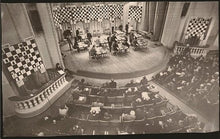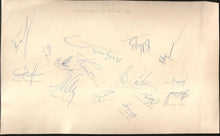Author: USSR Chess Federation signed Boris Spassky, Michal Tal, Anatoly Karpov, Alexander Beliavsky, Efim Geller, Paul Keres, Victor Korchnoi, Nukhim N Rashkovsky, Gennadi Kuzmin, Vladimir Savon, Evgeni Ellinovich, etc
Year: 1973
Publisher: USSR Chess Federation
Place: Moscow
Description:
Oblong photograph (6 3/4" x 11 1/4") Signed by 14 of the 18 contestants Boris Spassky, Michal Tal, Anatoly Karpov, Alexander Beliavsky, Efim Geller, Paul Keres, Victor Korchnoi, Nukhim N Rashkovsky, Gennadi Kuzmin, Vladimir Savon, Evgeni Ellinovich Sveshnikov, Mark Taimanov, Vladimir Borisovich Tukmakov, Orest Averkin and one non contestant Viktor Davidovich Kupreichik on the verso. The photograph shows the stage were the contest took place with lined up game tables and the participants during the competition. In the foreground a part of the auditorium with seated spectators.
In the aftermath of Robert James Fischer's victory over Boris Spassky in the 1972 World Championship, the Soviet Union had been humiliated and humbled by an American, and the 35+ year rule of the Soviet chess machine over the international chess world had finally been put to an end. The consequences of this result were felt in Soviet chess for months after. Mark Taimanov, Tigran Petrosian, and Spassky were all reprimanded for their failure to stop Fischer. Consequences continued into the 41st USSR Championship, held in the Soviet capital of Moscow, from October 2-26, 1973. The tournament was organized to be the strongest in a decade. In addition to the four qualifying players who had each won a semi-final (Orest Averkin, Karen Grigorian, Nukhim Rashkovsky, and Evgeni Sveshnikov), the very strongest grandmasters of the Soviet Union received forced invitations to participate. The list was a collection of former world champions, multiple Soviet title winners, and the very strongest of the Soviet school, including: Spassky, Petrosian, Mikhail Tal, Vasily Smyslov, Anatoli Karpov, Viktor Korchnoi, Efim Geller, Paul Keres, Lev Polugaevsky, Taimanov, Leonid Stein, Vladimir Tukmakov, Vladimir Savon and Gennadi Kuzmin. Victor Davidovich Baturinsky, the vice-president of the USSR chess federation, and a Colonel of Justice, explained clearly to all the participants that their attendance was not only obligatory, but their very future as Soviet chess players (and the favors imparted therein) depended on their performance in the championship. Stein died before the championship took place and he was replaced by junior world champion Alexander Beliavsky. In addition to the composed line up, it was made known that draws of thirty moves or less were 'discouraged' by the organizers. Although short draws did occur, the schedule of play and the intense combat among the contestants was arduous. It was Spassky, after failing in Reykjavik, who emerged victorious by a full point. This edition did have the desired effect of revealing future world title candidates, as Karpov and Korchnoi tied for second along with two other contestants and would face each other the following year for what ultimately was the de facto world championship.
Condition:
Slightly tinted, trimmed at the bottom irregularly else a very good copy of an interesting chess historical document.
Year: 1973
Publisher: USSR Chess Federation
Place: Moscow
Description:
Oblong photograph (6 3/4" x 11 1/4") Signed by 14 of the 18 contestants Boris Spassky, Michal Tal, Anatoly Karpov, Alexander Beliavsky, Efim Geller, Paul Keres, Victor Korchnoi, Nukhim N Rashkovsky, Gennadi Kuzmin, Vladimir Savon, Evgeni Ellinovich Sveshnikov, Mark Taimanov, Vladimir Borisovich Tukmakov, Orest Averkin and one non contestant Viktor Davidovich Kupreichik on the verso. The photograph shows the stage were the contest took place with lined up game tables and the participants during the competition. In the foreground a part of the auditorium with seated spectators.
In the aftermath of Robert James Fischer's victory over Boris Spassky in the 1972 World Championship, the Soviet Union had been humiliated and humbled by an American, and the 35+ year rule of the Soviet chess machine over the international chess world had finally been put to an end. The consequences of this result were felt in Soviet chess for months after. Mark Taimanov, Tigran Petrosian, and Spassky were all reprimanded for their failure to stop Fischer. Consequences continued into the 41st USSR Championship, held in the Soviet capital of Moscow, from October 2-26, 1973. The tournament was organized to be the strongest in a decade. In addition to the four qualifying players who had each won a semi-final (Orest Averkin, Karen Grigorian, Nukhim Rashkovsky, and Evgeni Sveshnikov), the very strongest grandmasters of the Soviet Union received forced invitations to participate. The list was a collection of former world champions, multiple Soviet title winners, and the very strongest of the Soviet school, including: Spassky, Petrosian, Mikhail Tal, Vasily Smyslov, Anatoli Karpov, Viktor Korchnoi, Efim Geller, Paul Keres, Lev Polugaevsky, Taimanov, Leonid Stein, Vladimir Tukmakov, Vladimir Savon and Gennadi Kuzmin. Victor Davidovich Baturinsky, the vice-president of the USSR chess federation, and a Colonel of Justice, explained clearly to all the participants that their attendance was not only obligatory, but their very future as Soviet chess players (and the favors imparted therein) depended on their performance in the championship. Stein died before the championship took place and he was replaced by junior world champion Alexander Beliavsky. In addition to the composed line up, it was made known that draws of thirty moves or less were 'discouraged' by the organizers. Although short draws did occur, the schedule of play and the intense combat among the contestants was arduous. It was Spassky, after failing in Reykjavik, who emerged victorious by a full point. This edition did have the desired effect of revealing future world title candidates, as Karpov and Korchnoi tied for second along with two other contestants and would face each other the following year for what ultimately was the de facto world championship.
Condition:
Slightly tinted, trimmed at the bottom irregularly else a very good copy of an interesting chess historical document.



